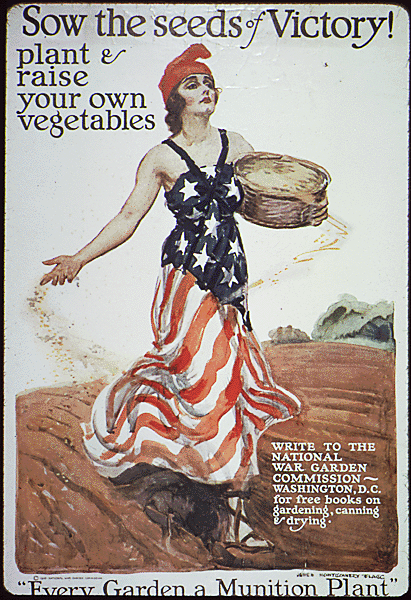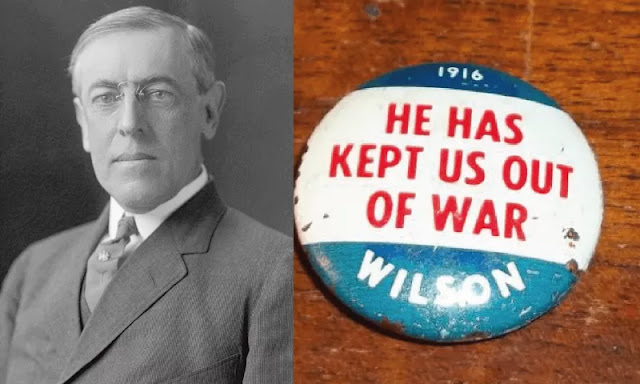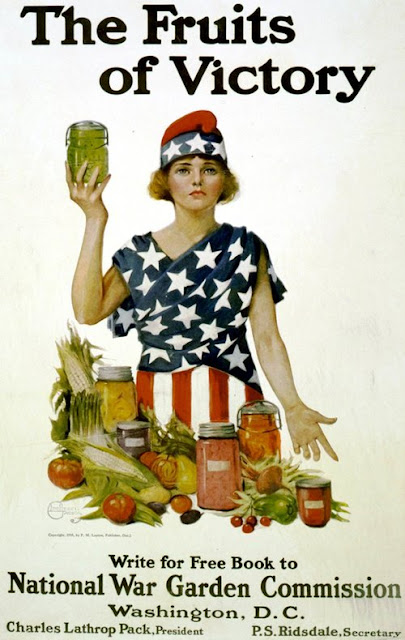President Woodrow Wilson won his re-election bid with the 1916 slogan, “He kept us out of war.” His belief was that the war in Europe would be a quick one. Knowing that America was considered a "melting pot," made up of people from all the nations involved, Wilson didn’t want to create conflict by taking sides that could create tension, thus tearing the nation apart. As the war continued, the U.S. remained neutral but participated in trade with the allied nations.
Sow The Seeds of Victory
As the war continued, a severe food crisis emerged in Europe, and the burden of feeding millions of starving people fell to the United States. By March of 1917, the National War Garden Commission was organized to encourage Americans to contribute to the war effort by planting, fertilizing, harvesting, and storing their own fruits and vegetables so that more food could be exported to our allies. In addition, citizens were encouraged to use all idle land for agricultural production — including school and company grounds, parks, backyards, and vacant lots.

Germany realized the only way to win the war was to keep the United States from supplying Europe with food and ammunition. They knew that by sinking American ships, they would force the U.S into action. Their gamble was they would win the war before the U.S. could send troops to Europe.

Photograph of the Lusitania, from the Illustrated War News, May 12, 1915
In 1917, Germany resumed unrestricted warfare by sinking seven U.S. ships and tried to
recruit Mexico to join against the United States by promising to help them
recover former territories. Wilson’s vow of neutrality was made impossible, and on April 2, 1917, he addressed Congress appealing that the United States enter the war as “the world must be made safe for democracy.” Four days later, the United States declared war on Germany.
Convincing the American people of their need to support the war effort would not be an easy task. On April 14, 1917, President Wilson established an organization called the Committee on Public Information to promote the decision. The CPI communicated through magazines, newspapers, books, phonographs, movies, music, and, my favorite, posters.
The illustrators used advertising strategies and graphic design to engage and stir up emotions reminding citizens who and what our nation was trying to protect.
Slogans like “Food Will Win the War” appeared in numerous ads and posters aimed at encouraging the American public to do their part in the war effort, advocating that civilians grow “The Fruits of Victory” by planting vegetable gardens.
President Woodrow Wilson called on citizens to plant vegetable gardens to help ward off the possible threat of food shortages. Americans took up the challenge as a civic and patriotic duty by planting what would become known as Liberty or Victory Gardens.
In addition, the war garden movement was spread by word of mouth through women’s clubs, civic associations, and chambers of commerce. Amateur gardeners were provided with instruction pamphlets on how, when, and where to sow and offered suggestions as to the best crops to plant, along with tips on preventing disease and insect infestations.
The undertaking was so popular that the government expanded its efforts to include distributing canning and drying manuals to help people preserve their surplus crops. As a result of these combined efforts, it was estimated that 3 million new garden plots were planted in 1917, and more than 5.2 million were cultivated in 1918, generating an estimated 1.45 million quarts of canned fruits and vegetables.
New Release
https://www.amazon.com/gp/product/B0B4F2TKS2
As a recent college graduate, Gibb is led down a path he never anticipated. And one unexpected meeting at a train station tips all of his carefully laid plans into chaos. In the void, Adella’s words of affection flow across the continents. The image of her smile and the consistency of her letters give him a reason to hope.
https://www.amazon.com/gp/product/B0B4F2TKS2
There is no ocean so great that love can’t cross.
In 1917 every man, woman, and child was called to civic duty as the “war to end all wars” encompassed the globe. When the patriotic call comes, Adella begins her campaign of encouragement by corresponding with the frightened and lonely soldiers. On the cusp of adulthood, the young woman is tired of living a cosseted life and hopes to gain her parent’s support when she wants to volunteer her services to the war effort. Her mother worries for her safety, but Adella is more concerned for her heart.As a recent college graduate, Gibb is led down a path he never anticipated. And one unexpected meeting at a train station tips all of his carefully laid plans into chaos. In the void, Adella’s words of affection flow across the continents. The image of her smile and the consistency of her letters give him a reason to hope.
Connect with Kimberly:

Sign up for my newsletter
Bookbub: https://www.bookbub.com/profile/kimberly-grist
Facebook: https://www.facebook.com/FaithFunandFriends/
Twitter: https://twitter.com/GristKimberly
Amazon Author Page: https://www.amazon.com/Kimberly-Grist/e/B07H2NTJ71









No comments:
Post a Comment